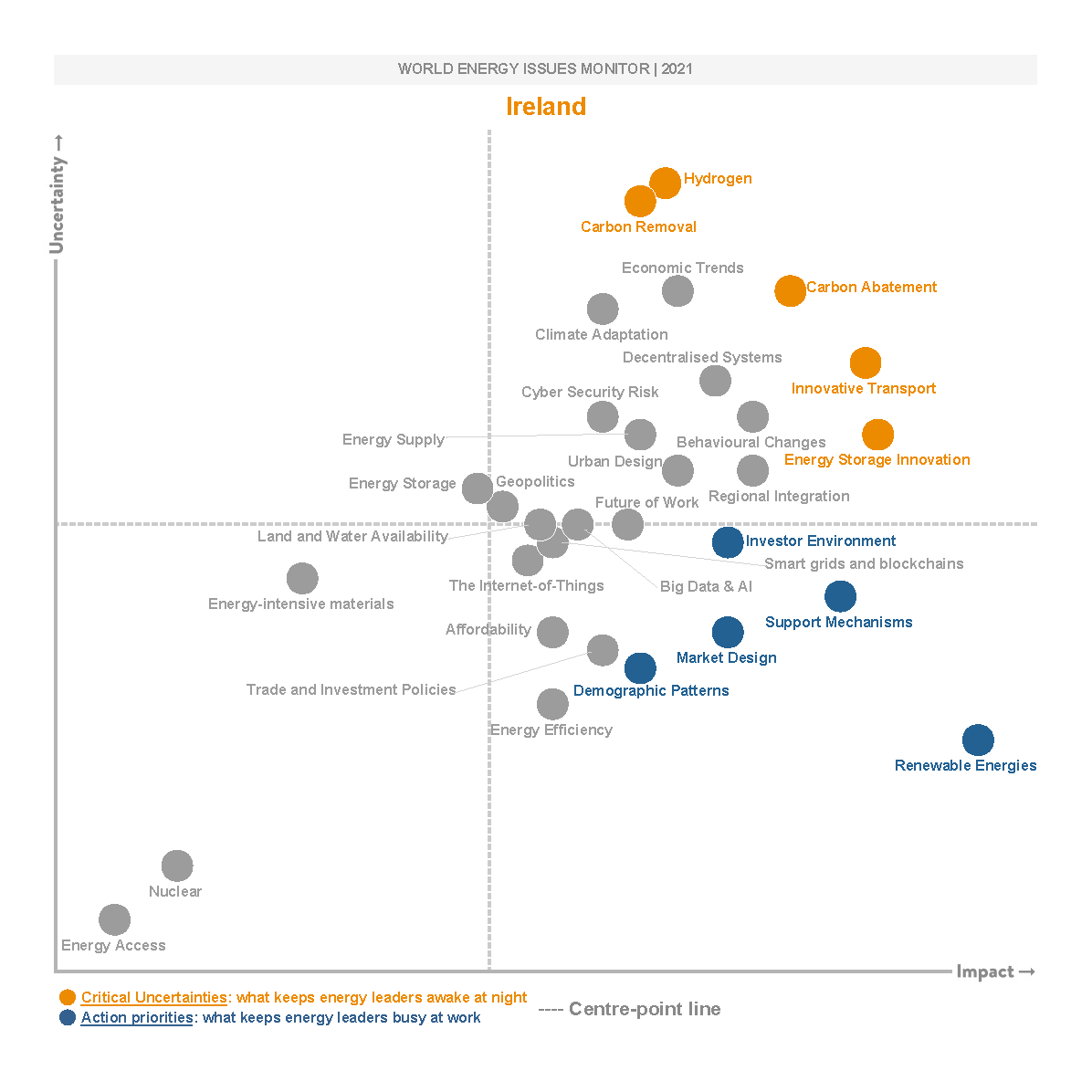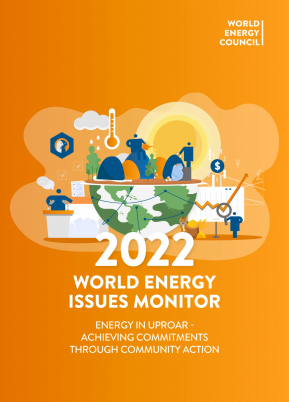The Ireland National Committee aims to promote sustainable energy development in Ireland, as a part of the World Energy Council’s energy vision. As a member of the World Energy Council network, the organisation is committed to representing the Irish perspective within national, regional and global energy debates. The committee includes a variety of members to ensure that the diverse energy interests of Ireland are appropriately represented. Members of the committee are invited to attend high-level events, participate in energy-focused study groups, contribute to technical research and be a part of the global energy dialogue.
Energy in Ireland

The broad direction of Ireland’s energy policy is identified in the 2021 edition of the World Energy Issues Monitor. The top three issues identified by respondents are; renewable energies; market design; and decentralised systems and behavioural changes. These strongly correlate with the high-level policy framework. At the EU level, policy has been set through the existing Clean Energy Package, with recent announcements about increased 2030 ambitions confirming this. Along with the Clean Energy Package, the Climate Action Plan published by the Irish government sets out a detailed blueprint for decarbonisation out to 2030 and to put the country on a compatible pathway for net zero by 2050.
The action priorities that emerge in the Issues Monitor suggest that respondents are focussed on implementing the Climate Action Plan. Renewable energies are the highest priority item but are seen to have a low uncertainty. There is a call for action on support mechanisms and the investor environment which is understandable given the scale of investment needed in the coming decade. The Electricity Association of Ireland has published a study which suggests that a €32bn investment is required to achieve a 70% renewable electricity system by 2030.
The need to consider market design has also emerged as an action priority. This has arisen from
renewable investors who see the current market as being built around traditional generation;
those who are more focussed on electricity system flexibility requirements with high renewables and the need to decarbonise the residual dispatchable generation requirement; and
parties interested in gas and electricity system integration.
The action priorities also identify the need to consider demographic patterns, which will influence how people engage with the transition in terms of digitalisation, smart products and building stock retrofit.
Within the responses, there is a recurring theme about the need for infrastructure to be built to support the transition. This relates to planning and permitting of large-scale infrastructure (including interconnection) to support renewable electricity and to the role of the electricity Distribution System Operator (DSO) in delivering a distribution system that can support the required scale of ambition in electrification.
The key critical uncertainties that emerge from the survey results remain linked to Ireland’s energy policy; in that they represent issues that will have to be addressed in the country’s pathway to decarbonisation.
Energy storage is key for an island system like Ireland with very high levels of variable renewable electricity, and respondents see this as a key issue to address in the low carbon transition. Innovative transport emerges as an important issue for respondents: transport emissions make up 20% of greenhouse gas emissions. Responses show that transport innovation must come from better overall design and increased use of public transport and decarbonisation of the vehicles that will still be needed.
Carbon abatement and carbon removal also feature as critical uncertainties; this is intuitive since the EU and Ireland is on a target pathway of net zero by 2050. One third of Ireland’s greenhouse gas emissions arise from agriculture, and so offsetting through carbon removal must be part of the overall transition. Carbon removal can be achieved using Carbon Capture Usage and Storage (CCUS) in combination with natural gas, while carbon removal would involve negative emissions solutions such as land use, direct air capture of CO2 or bioenergy with Carbon Capture and Storage (CCS).
Finally, hydrogen emerges as a critical uncertainty. Hydrogen has become a major part of the energy transition narrative in the past two years. The European Commission has published a communication on a hydrogen strategy, which would see widespread hydrogen usage in hard-to-abate sectors. It remains an uncertainty since the specific use cases for hydrogen in Ireland are not identified. Respondents see roles for hydrogen sourced from green electricity or from gas and CCS.
Regarding preparedness for different events, there was lower confidence in preparedness for natural disasters, extreme weather events and malicious attacks, with higher confidence in the ability to deal with pandemics and structural changes on the demand side.








_368_520_s_c1_c_c.png)




